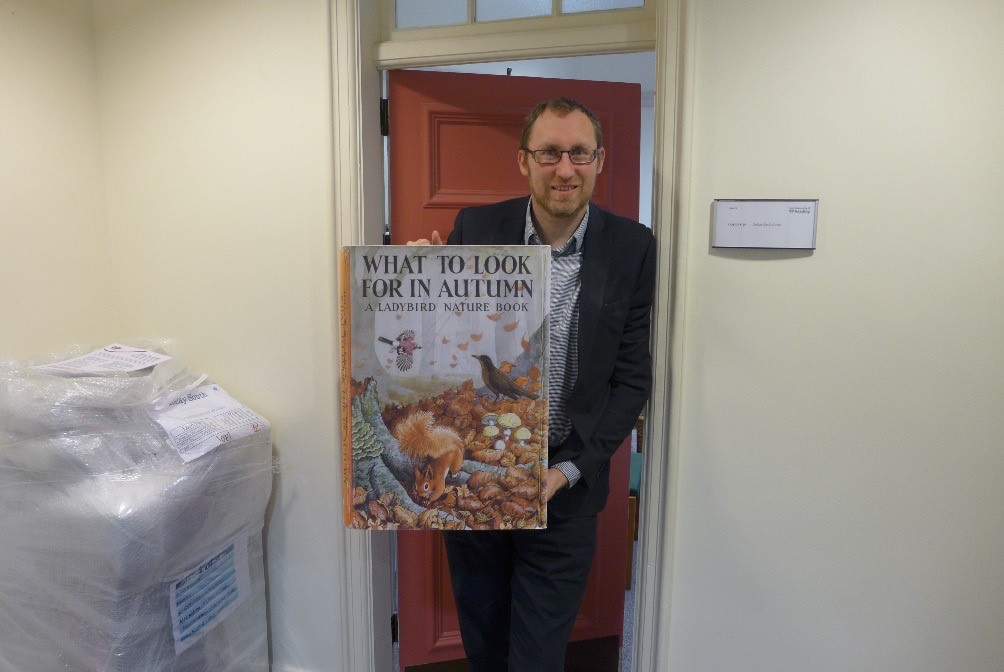Explore Your Archive: Interview with Guy Baxter, University Archivist
Whitney, our marketing volunteer, has been continuing her exploration of the world of archives in an interview with University Archivist, Guy Baxter…
- What is your job title and what do you do within the museum?
I’m the University archivist. I’m responsible for the University’s archive collections. Most of the archives I look after are the ones the University has collected but I also have responsibility for University’s own records that are of historical importance. The high profile archives we have are the archives of the Museum of English Rural Life, the archive of British Publishing and Printing and the Samuel Beckett archive
- What skills have you learnt within the world of archiving?
To be an archivist you need to have enthusiasm for history. You often have to deal with complex information in a way that has long term outcomes. In order to achieve that you must learn how to deal with people; sometimes people facing delicate circumstances in the context of bereavement, going into residential care or becoming redundant.
- Did you study a degree relevant to what you are doing at the moment?
I did history as my undergraduate degree and I did a one year taught master’s professional qualification in archive administration. There aren’t many archive courses but to get into a museum you need to have large blocks of experience, so after your degree you generally do a year’s graduate trainee type experience which is something we support here.
- Has your job role changed since you started?
I think my role has broadened. You end up involved in lots of different things when you work somewhere like MERL where it’s a small team. You have to be able to cover for each other. I now spend a lot of doing things like facilitating relationships between different stakeholders and supporting academics, or negotiating how we make archives available.
- What type of jobs and projects do you manage or oversee?
Some are externally funded projects and some are in-house projects. There might be digitisation, cataloguing or outreach projects. We’ve got short terms and long term projects, like our relationship with the Landscape Institute which I oversee which is a cataloguing and engagement project they’re funding. So it’s very varied. At the moment a lot of our focus is on the new Museum of English Rural Life galleries
- Have you had to branch outside of archiving and adapt yourself to other museum roles throughout your career?
Yes. In my previous role I was the Archivist as well as the Conservation Manager across collections. At one point I was managing the Loans Officer which means I had to understand that whole process. You need to understand elements of lots of different roles which makes for a varied career but obviously it’s a big challenge.
- Does it help to understand the bigger picture of your work and the organization as a whole?
The University needs us to be keyed into lots of things that are going on. We can’t just do what we want we need to think about the University’s priorities. We therefore have to be broad in the kind of things we support. That’s one of the great things about working here.
- What has kept you passionate and curious about museum work?
What I really love is making links between things that people haven’t thought of before and being able to see those pathways and occasionally even make new discoveries. You need to want to create order out of chaos and you have to get a certain amount of innate satisfaction from that to keep the drive going. The end result is that people discover new things they didn’t know which they can put into their essays.
- What is the most important quality you look for in an archivist?
You need a good level of attention to detail and accuracy. You need to be able to prioritize. I always look for people who have good professional instincts. Archive work is tricky if you overthink it because although we have to base decisions on some evidence, we don’t always know what the future research value of something will be. So we have to make informed guesses about what’s important and what’s a footnote. You need to have a passion for the stories that would come out of our past.
- What’s the most exciting part of your job?
I always really like teaching especially when the students give me something back or they’ve discovered something new. I find that really amazing. I like it when we make progress on things that have been waiting for a long time. For instance, we’ve had an archive on loan for about 40years which has finally been granted to the University.
- Do you have any projects or ongoing work you’re doing at the moment?
A lot of our work is going into the relaunch of new galleries and on the Landscape Institute archive with the initial stages for the funding now coming to an end. We are also engaged in a lot of academic projects.
- What advice would you give to students hoping to become archivists or work in a museum?
Get work experience! I know it’s hard to volunteering work or an internship when you need paid work. I would suggest just getting good blocks of experience as well. You can pick up a flavour of somewhere from a short stay but you really need to be in every day to get an idea of what the place and the job is really like.

